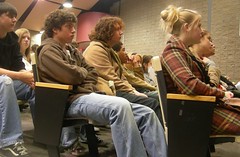On the first day in geography class the term was 'demographics." We looked at a profile of Trudeau's classes' middle school background. A little over 50% of students said they were from Caddo Middle. After that school, the distribution was widespread. A dozen schools are represented. Sadly, only one student in some 140 said they'd gone to a school outside of North La.
Detecting patterns, or trends, in the statistics is the more difficult task. One interpretation of the effect of a wide number of schools represented in the first-year group is to assume most students are looking for new friends.
The lack of regional diversity - almost no out of state students - is evidence of stagnation, said Trudeau. Indeed, the Times recently reminded the public that Shreveport's population is shrinking.
Demographics refers to selected population characteristics, says Wikipedia.org, as used in government, marketing or opinion research, or the demographic profiles used in such research.
Commonly-used demographics include race, age, income, disabilities, mobility (in terms of travel time to work or number of vehicles available), educational attainment, home ownership, employment status, and even location.
Demographic trends describe the changes in demographics in a population over time. For example, the average age of a population may increase.
Asking students whether they had a Myspace page or Facebook page (or both) produced one type of profile of student internet usage. Some 80% of students responded that they are active on one of the popular sites. Perhaps 15% said they were active on both sites.
A profile of the current generation as cited by Wikipedia says:
Generation Y cohort, also called N Generation (born from 1984 to 2001)
* Memorable events: rise of the internet, September 11 attacks, cultural diversity, 2 wars in Iraq.
* Key characteristics: quest for physical security and safety, patriotism, heightened fears, acceptance of change, technically savvy, environmental issues.
From the Greek de·mos (dē'mŏs') n.
1. The common people; the populace.
2. The common people of an ancient Greek state.
graphy: writing
Tuesday, August 14, 2007
Subscribe to:
Post Comments (Atom)


No comments:
Post a Comment